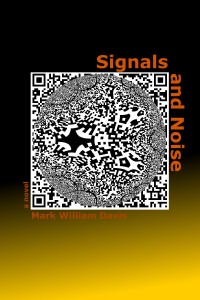 Monotony is the essential character of those late nights, so familiar to Zach and all his fellows. Monotony, but restful and calm, withholding the sharp edges and the intaglios of faces that define everyday interactions, while still remaining a part of the web of life. He could send an AetherNote or email and get a response, but without the complexities of the face had he been talking to the person. There were gigabytes of missed nuance, pursing lips, pauses, dilating pupils, flush responses—all lost behind the veil of electronica. Moreover, he could pause for that brief moment without any awkwardness, and they could pause as well, waiting for the ideas to filter out of the calamity of neural collisions. When everyone can order thoughts a hair faster than ever before in history, yet still interact deep into the night like they were sitting at a pub or around a campfire, there is an acceleration of competitiveness, a capacity for intellectual posturing. The new assholes, the new religionists, the new atheists, the new technologists, the strident politicos, the snarky personalities—everyone primps and props their online identities behind this veil of witty pretense, hearts racing as they snap at the refresh icon, waiting for the cannonball retort.
Monotony is the essential character of those late nights, so familiar to Zach and all his fellows. Monotony, but restful and calm, withholding the sharp edges and the intaglios of faces that define everyday interactions, while still remaining a part of the web of life. He could send an AetherNote or email and get a response, but without the complexities of the face had he been talking to the person. There were gigabytes of missed nuance, pursing lips, pauses, dilating pupils, flush responses—all lost behind the veil of electronica. Moreover, he could pause for that brief moment without any awkwardness, and they could pause as well, waiting for the ideas to filter out of the calamity of neural collisions. When everyone can order thoughts a hair faster than ever before in history, yet still interact deep into the night like they were sitting at a pub or around a campfire, there is an acceleration of competitiveness, a capacity for intellectual posturing. The new assholes, the new religionists, the new atheists, the new technologists, the strident politicos, the snarky personalities—everyone primps and props their online identities behind this veil of witty pretense, hearts racing as they snap at the refresh icon, waiting for the cannonball retort.
Democratizing it is, but with the side effect of drowning out the instant, unfiltered and emotive response on the one hand, and the dramatically conditioned and elaboratively intellectualized riposte on the other. There was too much lag for spontaneity and too little for detailed flourish. It is a channel that emphasizes bluster and bombast in securely short constructs. And thought followed suit. Thought on the average got better, but the best thought was drowned out by the long tails of opinions washing through them like the wake of a whale. Acceleration itself accelerated, too, and bloggers were posting faster than responses could be read—two or three times a day—and emails were sent just to assert a role in the ongoing Sturm und Drang, like minor keys singing provocatively against the quiet of those nights, against the monotony, the essential quiet that once was empty.
Zach was feeling again through The Spinner’s world, listing out his connections and zeroing in on their backgrounds, sifting through county records and USENET backgrounders, watching for their signals. There was a process, of sorts, but it was like the foraging of ants following pheromone trails. A tidbit led to a scent, then another tidbit, then a possible payout of information. But the payout was tentative to start with, and was only held down like a cat’s paw holds down a butterfly, until there was sufficient resolution and cover of all the linkages, otherwise releasing the facts back into the wild. Ignore it. It was nothing. Start again: prodigal gathering then sifting down through a filter of parsimony. Ambiguity was the enemy, especially for names and dates. The more ambiguity, the more parsimony and care that was required. But when there was resolution, it was a little victory, and Zach strutted around his room, tweeting his kingness and texting victory signals out from the cavern.
The Signal was in there, too, but was constantly darting out of site like crawfish in a muddy ditch. Even as Zach zeroed in on a faint reflection—an echoed reminder of the patterns he kept seeing—he was beginning to doubt that the pattern was meaningful. If it was significant, why wasn’t it significant enough to erase its own trail? There was a dissonance to its own existence that Zach had never seen in anything else. Code solved problems. Code sold click-throughs. Code instrumented desires. Code did not slither and leave trails. Code was not snails.
…